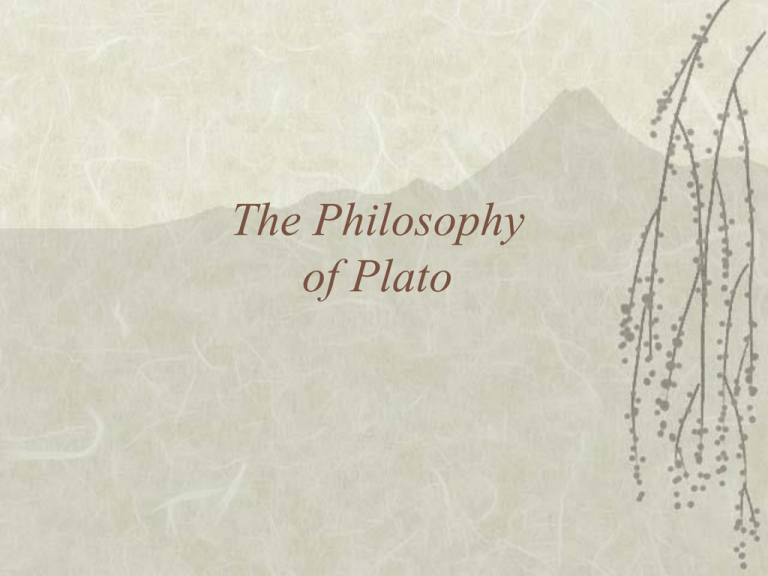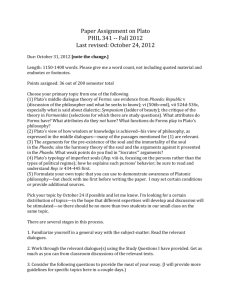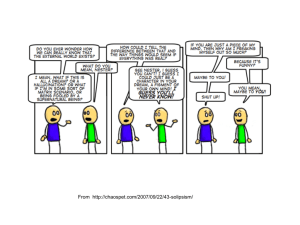The Philosophy of Plato
advertisement

The Philosophy of Plato A Brief History of Plato Born in Athens in 427 BCE Disciple of Socrates Plato’s philosophy was influenced by Socrates Founded the Academy, to train leaders in philosophy, in Athens in 387 Plato’s Dialogues Early Dialogues Middle Dialogues Later Dialogues Apology Gorgias Symposium Crito Meno Phaedo Laches Euthydemus Republic, Euthyphro Hippias Timaeus Republic, Book 1 I and II Cratylus Books 2-10 Laws •Most of Plato’s philosophical writing is in the form of dialogues •Total of 42 Dialogues •Socrates is used in all of Plato’s Dialogues Early Dialogues Wrote them before he had a philosophy of his own Socrates is portrayed historically accurately Mainly critical of the moral views of others Middle Dialogues Begins coming up with his own philosophy Develops some metaphysical (philosophical principles) and epistemological (nature of knowledge) positions. Begins introducing his theory of the forms into his writing Late Dialogues Socrates is used purely to advance Plato’s own views His approach is constructive—used mainly to develop his own mature philosophical system General Ideas Inherited Socrates’s philosophy Attempted to complete it by adding a foundation in metaphysics Believed philosophy must render man morally better The Socratic Philosophy The only real wisdom is knowing that you know absolutely nothing The highest good is the improvement of the soul— the care for wisdom and truth – Virtue does not come from money, but money come from virtue Virtue is knowledge – Evil and wrongdoing come from lack of knowledge or ignorance The Concept of the Philosopher-King Plato initially thought revising the Athenian constitution would end the moral degeneration of Athens Then realized philosophy was the key Only kings that knew philosophy or philosophers that were kings would know what true justice was. Plato’s Metaphysics There is a distinction between “things” and “forms” This must be understood before being able to understand Plato “Things” are what we can perceive with our senses “Forms” are eternal and static Theory of Knowledge Thought Objects Reason (Dialectic) Higher Forms Understanding (Science and Mathematics) Forms of Science and Mathematics Belief (Perception) Things, Objects Knowledge Opinion Conjecture (Imagination) Shadows, Images, Reflections Intelligible World Visible World Imagination or Conjecture Level 1 Imagination is the lowest level on the divided line of knowledge Mental activity is at a minimum – Awareness of shadows, optical illusions, and the like Belief Level 2 Begins to have common sense Perception of concrete objects occur at this level – Recognition of things such as threedimensional visible objects Classification and organization of perceived objects begin at this level Rational Understanding or Intellect Level 3 The crossing of the line represents the change from the knowledge of a plumber to the knowledge of a civil engineer Perception of abstract objects occur at this level The Theory of Two Worlds Sensible World World of the Forms appearance (seems real) reality (is real) immanent (within space and time) transcendent (beyond space and time) becoming (ever changing) being (eternal and unchanging) particular and imperfect absolute and perfect many instances (copy; imitation) one essence (archetype) perceived by senses known by reason subjective (dependent upon my perception) objective (exist independently of my mind) Examples: a computer, a person Examples: Justice, Goodness The World of the Forms The world of Forms is the “real” world Forms are abstract Things that can be perceived by the senses can be derived from Forms. The world of Forms consists of eternal and unchanging abstract concepts such as Justice and Beauty The Sensible World The Sensible world is a shadow or imitation of the world of Forms – The shadow represents a concrete object It is impossible to derive a Form from a Sensible thing Sensible things only exist because of participation A book comes into being because it is participating in the form of Bookness. Significance of the Two World Theory Why would Plato need to develop such a complicated metaphysical system? Plato used this system to counteract the Sophists’ relativism The Sophists believed that true and false, good and bad, were merely opinions. This would have led to the death of philosophy Reason Level 4 Highest level of knowledge Mind uses the method of dialectic – Dialectic is the crown-science of all sciences Dialectic identifies all of the forms A philosopher can attain the knowledge of dialectic through love of truth, which enables him to reach the Idea of the Good, the supreme form – The Idea of the Good gives truth which makes the forms intelligible The Tripartite Soul Man is made of 3 elements – Ability to use language and reason – Bodily desires and needs – Emotional drives such as anger and sorrow Justice in the Soul Justice for a man is functioning in accordance with his form, the three parts of his soul Reason may know good, but it is in conflict with bodily desires The Soul as Organism The dysfunction of any of the three elements causes the soul to lose its wellbeing Neither a life devoted to bodily desires nor a life devoted to denial of bodily desires would be functional Conflict Within the Soul Reason comes into conflict with the bodily appetites The third element, emotional drives, serves as a mediator of conflicts – It can act on behalf of either reason or the appetites The Theory of the Three Types of Souls The person dominated by reason seeks wisdom The person dominated by emotional drives seeks success and fame The person dominated by bodily appetites seeks material wealth Ethics: The Good Life Pleasure is not the highest good for humans Pursuing pleasure as the highest good will destroy you Highest good consists of fulfilling all three elements in the proper order – First, reason – Then emotional drives – Last, bodily appetites The Harmony of the Soul The three elements of the soul form a harmony like a musical harmony The good life is the harmoniously balanced life, which satisfies all three elements This is the Good Life, the life of human happiness Government When a society called on itself to fulfill its needs, Plato had a social structure: – The philosophers direct the state; – The warriors defend the state; – The producers must attend to the material production of those things that are needed by the state. • Divided further by skills and jobs Plato is strictly aristocratic – Philosophers direct the state because they are wise and they know of the Eternal Forms, the constant forms of Knowledge. – Also, they know the essence of the state and show the other two lower classes the way that must be followed in order to attain the end of the state Bibliography www.rit.edu/~flwstu/plato.html Book of Knowledge Encyclopedia www.philosophypages.com/hy/2f.htm#memo www.philosophypages.com/hy/2g.htm#jui www.philosophypages.com/hy/2h.htm#women www.radicalacademy.com/adiphilmetaphysical2.html From Socrates to Sartre: the Philosophic Quest Author: T. Z. Lavine






